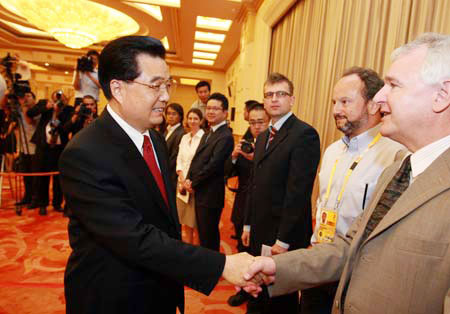|

President Hu Jintao (L) shakes hands with a journalist at the Great Hall of the People in Beijing August 1, 2008. [Xinhua]
|
BEIJING -- Politicizing the Olympics violates the Olympic spirit and will not work, President Hu Jintao said on Friday.
"It also runs against the shared aspirations of people all over the world," Hu said in a joint interview with journalists from 25 news organizations around the world.
The interview came a week ahead of the start of the Beijing Olympic Games.
"It is inevitable that people hold divergent views, but politicizing the Olympics will not solve the problems," Hu said.
"Instead, those issues can be resolved on the basis of mutual respect, by narrowing the differences and expanding common ground."
The Games not only offers an arena for athletes from around the world to realize glory and dreams, but also provides a platform for people to enhance understanding, he said.
He urged foreign reporters, while in China, "to help communication and understanding between China and the peoples of the world".
On Chinese people's enthusiasm for the Games, he said: "Hosting the Olympics is a century-old aspiration of the Chinese people."
He cited the fact that as early as 1908, some Chinese had come up with the idea to host the Games.
"As Beijing finally became the host of the Olympics after 100 years of longing, all Chinese people cherish this golden opportunity," Hu said.
The Games will have enduring benefits for China and leave a positive "spiritual legacy", he said.
Hu repeatedly touched on topic of the peace and friendship China will display during the Olympics.
"By hosting the Beijing Games we will show the world that the Chinese people are a peace-loving nation," he said.
"The determining factor in securing the success of the Olympic Games is to work vigorously to promote the Olympic spirit featuring friendship, solidarity and peace.
"The key is to ensure that athletes from all countries and regions have a level playing field to compete fairly," he said.
On the estimated $40 billion the Games has cost Beijing - including spending on the new airport terminal, subway lines and state-of-the-art facilities, Hu said: "The investment is worth it."
China has kept to tight budgets in preparing for the Olympics, he said, adding that the organizing committee (BOCOG) has scrutinized every penny to ensure it was used properly.
During the 70-minute interview at the Great Hall of the People, Hu also touched on China's economy.
The country had overcome the May earthquake and freak snowstorms that paralyzed central and southern China, he said.
But the domestic economy faces "increasing challenges and hardships," he said.
Hu singled out inflation as a key concern, but balanced that with a call for continued growth.
"We must maintain steady, relatively fast development and control excessive price rises as the priority tasks of macro adjustment," he said.
On the political front, the president said the country will continue pursuing comprehensive reforms "including reforms of the political system".
The government will "continue expanding socialist democracy and developing a state of socialist rule of law," he said, calling for a "lively, stable and harmonious political setting".
After the Olympics, the government will press ahead with reforms to make government departments more responsive to public demands, he said.
Hu's other points
The Chinese government and people have been working in earnest to honor the commitments made to the international community when it was awarded the Olympics.
China's military policy is defensive and the country's development "will in no way affect or threaten the interests of others".
China will continue to facilitate foreign reporters' work after the Games.
The government will step up environmental protection and energy efficiency, and reduce emissions.
Xinhua - Agencies